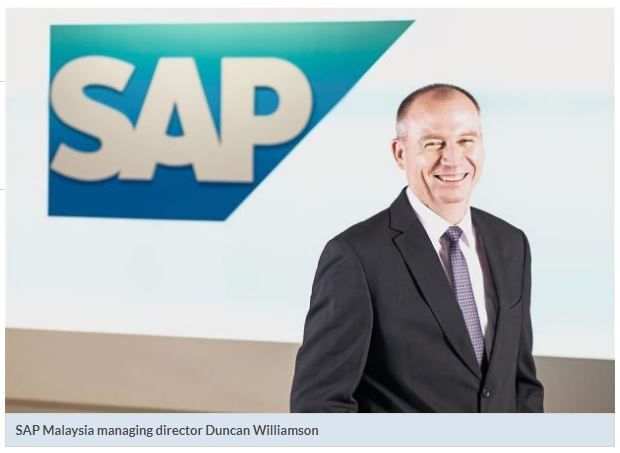Malaysian family-owned business must learn from gig economy
SAP Malaysia recently commissioned The Economist to conduct a study that assessed the future readiness of family owned businesses around Southeast Asia.
The study gathered responses from over 300 executives from family owned businesses across the region and shed some interesting light on how they utilise technology or if they are even considering changing their business to meet new global challenges.
A lively panel discussion was held as SAP Malaysia’s managing director Duncan Williamson together with Economist Corporate Network global editorial director Andrew Staples and Malaysia Digital Economy Corporation (MDEC) vice president of enterprise development Gopi Ganesalingam discussed on the study’s findings.
Williamson is of the opinion that the real pressure family owned businesses face is from all these new technologies such as the Internet of Things (IoT), machine learning to artificial intelligence (AI).
The vast amount of data generated from these technologies will be useless unless someone is able to understand and interrogate the data from multiple angles.
There lies a problem in the talent available within Malaysia as there has been substantial brain drain occurring where talent spills over to neighbouring countries.
Williamson shared that before he took the mantle of managing director, he was warned before that his biggest challenge in the role is finding suitable talents to add 24 new hires to SAP Malaysia’s 155 work force.
“It is time to change the culture and mindset of managers,” he said. “The younger generation, i.e. millennials, are not interested in how much you pay them but they want to know your core values and what you believe in.”
There is recognition that businesses need to leverage on young and upcoming talent. Not only are they savvier in terms of technology but they also represent a significant portion of your future customer base.
“You need to bring them in and prepare to leverage on them. Give them lots of space to operate in your business,” advised Williamson.
MDEC’s Gopi agrees on this point. He said that a younger workforce is more receptive to looking at technology to increase efficiency and reduce the reliance on many workers. He also stressed the importance of a high calibre workforce, one that comprises data scientists and analysts to help take businesses to the next level.
“Soft skills like building partnerships, trust and being able to work in fragmented virtual teams are more important than hard skills these days,” he notes.
On the same topic of talent, family owned businesses need to grapple with the coming of the gig economy and how they treat the increasing number of freelancers under their employ.
“Let’s be realistic, this is not exactly something new nor is it difficult to deal with. In fact, it is akin to how you have workers in a construction project that temporarily work on the project,” he said. “The challenge is readily addressed via SAP Fieldglass which is designed to specifically address the external workforce.”
So in the same way, family owned businesses need to learn how to manage those from the gig economy and not treat them too differently from regular employees and vendors.
The question businesses need to be asking themselves is, how can they leverage on all these technologies together to connect the customer with suppliers and subsequently reduce the amount of inventory carried and improve the overall service level.
There are however examples of big family owned businesses in Malaysia who are fast to adapt to the changing technology scene. One of them is Grab, which had approached SAP asking for a solution to help implement cost controls for their employee’s travel claims.
Fortunately, SAP’s Concur automates expenses from receipt to reimbursement, drastically reducing the amount of time people spend making claims.
Williamson, however, cautioned that conversations can easily turn towards technology without focusing on the outcome that needs to be achieved.
“Everyone wants to “Uberize” everything thing but successful organisations need to determine what are the outcomes they want and hold individuals in their management and leadership teams accountable for those outcomes,” he said.
To put it simply, Williamson believes that technology needs to be there for a clear reason rather than implemented for the sake of it. “We are going to need to change the way people think and do business and it is happening at a rapid pace,” he said.
Though the results of the study largely show that Malaysia’s family owned businesses are not all too prepared for a technology-driven future, Williamson believes that much can change and the results may be different should the survey be conducted again in a year’s time.
In this context, Williamson believes that SAP’s local partners have a key role to play in educating local family-owned businesses and SMEs on benefits of realising technology as a critical business enabler.
“SAP’s local partners are an extension of our commitment to support every customer to become a best-run business. Together, we help the world run better and improve people’s lives,” said Williamson, adding that being a best-run business means being an “intelligent enterprise”.
“Our partners have the necessary knowledge and industry expertise to assist local businesses in their transformation journeys toward greater profitability, productivity and operational efficiencies. Together, our strategy is therefore to deliver the intelligent enterprise for our customers, so that they can achieve their desired outcomes,” concluded Williamson.
Note: SAP Malaysia will be hosting a Business One (B1) Partner Gathering on 25th October 2018 from 9am to 1pm at the SAP Malaysia office in Kuala Lumpur. SAP B1 is a business management solution beneficial for SMEs as it aims to automate key business functions in financials, operations and human resources. Participation for the event is by invitation only and, for more information, please contact 012 3278214 or email [email protected]
Source: https://www.thestar.com.my/business/business-news/2018/10/24/malaysian-familyowned-businesses-must-learn-from-gig-economy/#LC8SHCCIix6hJ7me.99


 English
English




